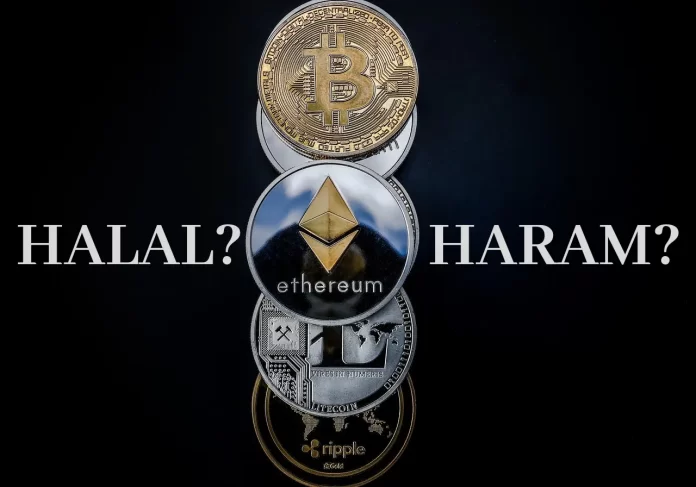Cryptocurrency, a digital marvel that has taken the financial world by storm, has sparked a heated debate within the Islamic community. The question on everyone’s mind is: Is cryptocurrency halal in Islam? We explore Islamic law and finance in-depth in this extensive post to clarify this intricate and sensitive topic.
Understanding Halal and Haram in Islam
In order to understand “is cryptocurrency halal in Islam?”, we must first understand the definitions of what is halal (permissible) and haram (prohibited). Islamic teachings are based on the Quran and the Sunnah.
Cryptocurrency: The Technological Enigma
The financial environment has undergone a change as a result of peer-to-peer transactions and the decentralization brought about by cryptocurrencies. The blockchain technology that underpins these digital assets enables intermediary-free, secure, and transparent recordkeeping.
Is Cryptocurrency a Currency or Commodity?
One of the central debates revolves around how cryptocurrencies are classified. Are they a form of currency or a commodity? Islamic finance principles differ in their treatment of currencies and commodities, making this distinction crucial in determining their halal status.
The Role of Riba (Usury) in Cryptocurrency
Islamic finance strictly prohibits usury (riba) as it promotes injustice and exploitation. The presence of interest in conventional financial systems has led to reservations about the halalness of cryptocurrency, as some transactions might involve interest-like gains.
Cryptocurrency and Gharar (Excessive Uncertainty)
Gharar refers to excessive uncertainty or ambiguity in a transaction, and its presence is discouraged in Islamic finance. Critics argue that the volatile nature of cryptocurrency prices may lead to speculative behavior, which could be deemed non-compliant with Islamic principles.
Views of Prominent Scholars on “Is Cryptocurrency Halal in Islam?”
To gain a holistic understanding, we explore the perspectives of renowned Islamic scholars on cryptocurrency. Some scholars argue that certain cryptocurrencies, like Bitcoin, can be deemed halal as they possess intrinsic value and facilitate legitimate transactions. Conversely, others express concerns over the lack of regulatory oversight and the potential misuse of digital assets.
Efforts Towards Halal Cryptocurrencies
Recognizing the need for halal financial solutions, some initiatives have emerged to create cryptocurrency projects specifically designed for compliance with Islamic principles. These projects aim to address concerns related to riba, gharar, and illicit activities.
The Importance of Intention and Context
Islamic jurisprudence places significant emphasis on intention (niyyah) and the context of actions. This principle applies to cryptocurrency usage as well. Muslims engaging in cryptocurrency transactions must examine their intentions and ensure they align with halal objectives. So the answer of question, is cryptocurrency halal in Islam? mainly depends on your intention and context of actions.
Consulting with Knowledgeable Scholars
As with any matter of Islamic law, seeking guidance from knowledgeable and qualified scholars is essential. Individual circumstances and contexts can vary, necessitating personalized advice to determine the permissibility of engaging with cryptocurrency.
Reasons Supporting the Permissibility of Cryptocurrency in Islam
Technology’s Neutrality: Proponents of cryptocurrency argue that the technology itself is neutral and not inherently haram. Blockchain technology, which underpins cryptocurrencies, can be utilized for various legitimate purposes beyond financial transactions, such as supply chain management and record-keeping. It is the application and intent of use that determine its compliance with Islamic principles.
Financial Inclusion: Cryptocurrencies have the chance to encourage financial inclusion, specifically in areas with limited access to traditional banking services. By adopting cryptocurrencies, those without access to banks can participate in the global financial system, enhancing economic empowerment and reducing poverty. Islamic social justice and charitable giving are compatible with this.
Transparency and Accountability: Islamic finance places great emphasis on transparency and accountability, making blockchain technology appealing to those seeking ethical financial solutions.
Halal Business Ventures: Some scholars argue that engaging in legitimate and halal business ventures related to cryptocurrencies can be permissible. For example, creating platforms that facilitate secure and transparent transactions or developing blockchain solutions for halal industries can be seen as ethical and compliant with Islamic principles.
Currency as a Medium of Exchange: As cryptocurrencies gain wider acceptance, some scholars view them as a potential medium of exchange for halal transactions. If used in accordance with Islamic principles, such as avoiding speculative behavior, cryptocurrency transactions can be considered legitimate.
Ownership of Digital Assets: Ownership of digital assets is permissible, and some argue that cryptocurrencies can be considered digital assets. Similar to other permissible forms of property ownership, owning and using cryptocurrencies responsibly may be deemed halal.
Financial Innovation: Proponents of cryptocurrencies see them as a form of financial innovation that can drive economic growth and development. By encouraging technological progress, supporters argue that cryptocurrencies contribute positively to society.
It is crucial to emphasize that these arguments represent the perspectives of some Islamic scholars and individuals who view cryptocurrencies as compatible with Islamic principles. As with any religious matter, the question of “is cryptocurrency Halal in Islam?” remains a topic of ongoing discussion and varying interpretations. Those considering engaging with cryptocurrencies are encouraged to seek guidance from knowledgeable religious authorities to make informed decisions in line with their faith.
Reasons Against the Permissibility of Cryptocurrency in Islam
Ambiguity in Origin: One of the primary concerns is the uncertainty surrounding the origin of cryptocurrencies. Unlike traditional fiat currencies, which are issued and regulated by governments, cryptocurrencies were introduced by anonymous entities. This lack of clarity raises doubts about the legitimacy of cryptocurrencies under Islamic principles, as it is essential to know the source and authorization of any currency or financial instrument.
Speculative Nature: Cryptocurrencies are highly volatile and subject to speculative trading. Some scholars argue that engaging in the speculative trading of cryptocurrencies resembles gambling, which is strictly forbidden in Islam. Profit-seeking in short periods without backing by real assets can be seen as akin to games of chance, which contradicts the principles of responsible and ethical financial conduct in Islam.
Lack of Tangible Assets: Islamic finance emphasizes the need for transactions to involve tangible assets to avoid ambiguity and ensure fair exchange. Unlike traditional assets like real estate or commodities, cryptocurrencies do not possess physical form and are not backed by any tangible assets. This raises concerns among some scholars, who question their compliance with Islamic financial principles.
Usury Concerns: Islamic finance prohibits usury (riba), which refers to the charging of interest on loans. Some scholars argue that certain cryptocurrency transactions, such as those involving lending platforms that charge interest on cryptocurrency loans, may involve elements of usury. This raises ethical questions about engaging in practices that conflict with Islamic principles.
Lack of Central Authority: In Islamic finance, there is a preference for financial systems with clear regulations and oversight by central authorities. Cryptocurrencies operate in a decentralized manner, without any central regulatory body governing their issuance and circulation. Because to the lack of a centralized authority, there may be a risk of abuse or a lack of oversight, both of which go against the Islamic norms for good financial governance.
Risk of Illicit Activities: Bitcoins have a history of being used for nefarious purposes including financing terrorism and money laundering. Although these problems are not inherent to cryptocurrencies themselves, some people have taken advantage of the anonymity and global reach of digital currency for illegal activities. Some academics may be skeptical of cryptocurrencies due to their association with illegal activity.
Ethical Concerns: Some scholars express ethical concerns about investing in cryptocurrencies due to their association with environmentally harmful mining practices and energy consumption. Mining activities for certain cryptocurrencies have been criticized for their significant carbon footprint, which clashes with the principles of responsible stewardship of the earth in Islam.
These were the arguments on the bases of which the question “is cryptocurrency halal in Islam?” were answered by the scholars.
Conclusion
In conclusion, the question of “is cryptocurrency Halal in Islam?” is a multifaceted issue that demands thoughtful consideration. While some scholars may assert that certain cryptocurrencies align with Islamic principles, others may express reservations. Muslims who are interested in cryptocurrencies must become knowledgeable about the underlying technology and the moral ramifications of their use.
Navigating the ethical conundrum surrounding cryptocurrency requires a deep understanding of Islamic finance, coupled with the wisdom of Islamic scholars. Muslims who wish to explore this emerging financial frontier must approach it with mindfulness, sincerity, and a commitment to upholding the values espoused by their faith.
Remember, the ultimate decision rests on personal conviction, guided by adherence to the divine principles of Islam.










target finasteride pharmacy
viagra or sildenafil
buy alprazolam online pharmacy
sildenafil 20 mg tablet
tretinoin cream online pharmacy
phentermine online us pharmacy
order sildenafil online